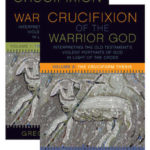We run our website the way we wished the whole internet worked: we provide high quality original content with no ads. We are funded solely by your direct support. Please consider supporting this project.

A Cruciform Dialectic
One of the most important aspects of God’s action on Calvary, I believe, is this: God revealed himself not just by acting toward humans, but by allowing himself to be acted on by humans as well as the fallen Powers. God certainly took the initiative in devising the plan of salvation that included the Son of God becoming human at “the right time” for him to get crucified (Rom 5:6). And God was certainly taking the initiative as Jesus taught and acted in provocative ways that were certain to get him crucified. Hence, Scripture says that part of God’s “deliberate plan and foreknowledge” was to have Jesus handed over (Acts 2:23) to wicked people to do what God’s “power and will had decided beforehand” should be done (Ac 4:28).
At the same time, as active as God was in revealing his nature on Calvary, we must also notice that this revelatory act took place by God allowing wicked humans and forces of evil to act out their wicked and violent intentions against Jesus. Indeed, the physical and verbal assaults Jesus absorbed in the process of being crucified were actually just a microcosm of the sin of the world that Jesus absorbed on the cross, thereby allowing every human throughout history to act on him.
It is within this dialectic of acting and being acted upon that God communicates his true identity, and given that his true identity is humble, self-sacrificial love, it’s hard to see how it could have been otherwise. A deity whose essence was power could reveal himself by unilaterally acting upon others, but not the one true triune God whose eternal existence is an unending act of three divine Persons giving themselves wholly over to one another.
As the biblical narrative attests, and as Calvary makes most explicit, God is a God who humbly makes space for agents whom he has created to possess a degree of autonomous “say-so” in effecting what comes to pass—even to the point that their “say-so” influences, and in limited ways, thwarts, God’s “say-so.” Hence, God’s typical way of working in and through human agents is by means of influence, not coercion. God respects the relative autonomy, personhood and free will of people, to say nothing of angels. And this is, at least in part, why his way of rescuing us from the prison we have placed ourselves in is a slow, gradual, arduous process that involves a great deal of patience and self-sacrifice on God’s part. For the same reason, it is a process that involves God relying on his wisdom rather than merely relying on his power to accomplish his purpose, as the quintessential revelation of God on Calvary makes clear and as Scripture repeatedly stresses.
The cross is thus the full revelation of God’s character precisely because it wasn’t a unilateral action of God toward humans but rather came about, in part, by God humbly allowing human and angelic agents to engage in hostile activity against God. For this same reason, the cross was not merely a revelation of God’s power but also of God’s wisdom. God wisely turned the evil he absorbed into good, including the good of glorifying his Father by revealing his true self-sacrificial character and freeing humans from their oppression to sin and the devil.
Photo via Visual Hunt
Category: General
Tags: Character of God, Cross, Cruciform Theology, Love
Topics: Attributes and Character
Related Reading

Podcast: Is God Fickle?
Is there anything at stake in our life? Greg balances God’s mercy and grace with the authenticity of free will. http://traffic.libsyn.com/askgregboyd/Episode_0255.mp3

Part 4: An Alternative Cross-Centered Approach
Image by Karl Pang via Flickr As I mentioned in Part II of this review, I am deeply appreciative of the fact that Flood grasps the centrality of enemy-loving non-violence in Jesus’ revelation of God. And while many, if not most, of the depictions of Yahweh in the Old Testament are consistent with this revelation, I…

Endorsements for Crucifixion of the Warrior God
Greg has gotten some really great endorsements for his upcoming Crucifixion of the Warrior God, so we thought we’d share them with all of you. If you want to learn more, you can go here. Enjoy! “We now have a plenitude of studies preoccupied with the vexed question of the violence of God in the Bible.…

God is Not a Monster
Pastor Brian Zhand has a way with words that captures the imagination. And he is a pastor that has taken time to read the church fathers. In a recent post, he quotes Saint Antony who wrote, “I no longer fear God, but I love him. For love casts out fear.” Brian confronts the common misconceptions and images of God that…

A Coming Storm
There is a storm beginning to brew on the horizon. It is a debate among Evangelicals about the violent depictions of God, stirred up largely by Eric Seibert’s Disturbing Divine Behavior. Here is a post that sounds “the clarion call.” The debate is presently around two options. Option #1: Traditionalists argue we must simply embrace…

Jesus, the Center of Scripture
Paul declared that Jesus was nothing less than the very embodiment of all of God. This distinction of “all of God” is important for us to understand what it means for us to see Jesus and God rightly. Battling proto-gnostic teachers who were apparently presenting Christ alongside other manifestations of God, Paul declares “in Christ…
